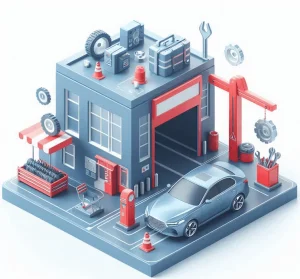Table of Contents
Discover expert insights and solutions for car AC repair in our comprehensive guide. Ensure a cool and comfortable ride all summer with our expert tips and advice.

When the scorching summer sun beats down, there’s nothing quite as refreshing as stepping into your car and feeling a blast of cool, crisp air from the air conditioning system. Your car’s AC system is more than just a luxury; it’s a crucial component of your driving experience, ensuring not only comfort but also safety and well-being during extreme temperatures.
In this comprehensive guide, we will take you on a journey through the world of car AC repair. From diagnosing common AC problems to understanding when to attempt DIY fixes and when to seek professional help, we’ve got you covered. Whether you’re dealing with weak airflow, strange noises, or unpleasant odors emanating from your car’s vents, we’ll provide expert insights and actionable advice to ensure your drives remain cool and comfortable throughout the summer.
Buckle up as we explore the nuances of car AC repair, offering you the knowledge and confidence to tackle AC issues head-on. By the end of this article, you’ll be well-equipped to keep your vehicle’s AC system running smoothly and enjoy refreshing drives, even on the hottest days.
Car AC Repair: A Critical Component
Your car’s air conditioning (AC) system isn’t just about luxury; it’s a critical component that significantly impacts your driving experience, safety, and well-being, especially when the summer heat is relentless. In this section, we’ll delve deeper into why maintaining and repairing your car’s AC system is of paramount importance.
Comfort and Convenience
First and foremost, a functioning AC system provides you with comfort and convenience during your journeys, making those hot summer days more bearable. It’s not just about staying cool; it’s about driving in a relaxed and pleasant environment. When your AC is working optimally, you can focus on the road ahead without the discomfort of sweltering heat distracting you.
Safety Matters
Safety should always be a top priority when driving. A properly functioning AC system contributes to your safety in several ways. For instance, it helps prevent driver fatigue, ensuring you stay alert during long drives. When you’re comfortable, you’re less likely to get drowsy behind the wheel.
Moreover, a cool cabin temperature enhances your concentration and decision-making abilities. It reduces the chances of heat-related illnesses, such as heatstroke or heat exhaustion, which can impair your ability to drive safely.
Protecting Your Vehicle
Your car’s AC system plays a role in preserving the overall health of your vehicle. When the AC is working correctly, it helps regulate the internal temperature of your car’s engine and prevents overheating. Overheating can lead to engine damage and costly repairs. By maintaining your AC system, you’re indirectly safeguarding the engine’s well-being.
Passenger Comfort
It’s not just about the driver; your passengers also rely on the AC system for comfort. Whether you’re traveling with family, friends, or even pets, ensuring a comfortable interior temperature is considerate and makes for a more enjoyable journey for everyone.
Resale Value
If you ever plan to sell your car, a well-maintained AC system can boost its resale value. Prospective buyers are more likely to choose a vehicle with a properly functioning AC over one that requires immediate repairs.
In summary, your car’s AC system is a critical component that affects your comfort, safety, vehicle health, and even the resale value of your car. Neglecting AC maintenance or ignoring issues can lead to discomfort, compromised safety, and expensive repairs down the road. Therefore, understanding the ins and outs of car AC repair is not just a matter of convenience; it’s a vital aspect of responsible car ownership.
Identifying AC Problems
Before you can address any issues with your car’s air conditioning (AC) system, it’s crucial to identify the problem accurately. Recognizing the signs of a malfunctioning AC system can save you time, money, and discomfort. Here, we’ll delve into the common indicators that signal your AC needs attention.
- Weak or Warm Airflow: One of the most apparent signs of AC trouble is when the airflow from the vents feels weak or warmer than expected. You might notice that even when you set the AC to its coldest setting, it fails to provide the refreshing coolness you’re accustomed to. This could indicate various underlying issues, from refrigerant leaks to compressor problems.
- Unusual Noises: Listen closely when you turn on your AC. If you hear strange noises, such as rattling, hissing, or squealing, it’s a clear sign that something is amiss. These noises can point to issues like a damaged compressor, a worn-out blower motor, or loose components within the AC system.
- Foul Odors: If unpleasant odors emanate from the AC vents when you turn on the system, it’s likely due to mold or bacterial growth within the system. These odors can be not only annoying but also harmful to your health. Ignoring them can lead to respiratory issues over time.
- Leaking Fluids: Keep an eye out for any puddles or dripping fluids under your car when the AC is running. Refrigerant leaks are a common problem and can be detrimental to both your AC’s performance and the environment.
- Inconsistent Cooling: If your AC blows cold air inconsistently or has temperature fluctuations, it could be a result of various issues, including a faulty thermostat, clogged filters, or even electrical problems.
- High-Pitched Whistling: A high-pitched whistling noise can indicate a refrigerant leak, which not only affects cooling efficiency but also poses environmental concerns.
- Vibrations and Shaking: When your AC system causes the car to vibrate or shake excessively, it could be due to imbalanced or damaged AC components. These vibrations can also impact your driving experience.
- Dashboard Warning Lights: Some modern vehicles are equipped with AC warning lights on the dashboard. If you see an AC-related warning light illuminated, it’s essential to address the issue promptly.
- Reduced Fuel Efficiency: A malfunctioning AC system can place additional strain on your vehicle’s engine, leading to reduced fuel efficiency. If you notice a significant drop in mileage, it’s worth considering the condition of your AC.
By paying attention to these signs, you can diagnose AC problems early and take appropriate action. Whether it’s a minor issue that you can address with a DIY solution or a more complex problem requiring professional attention, identifying the problem correctly is the first step in ensuring your AC system keeps you cool and comfortable during your summer drives.
Common AC Problems
Now that we’ve discussed how to identify AC issues, let’s delve into the specific problems you might encounter with your car’s air conditioning (AC) system. Understanding these common AC problems will help you diagnose the issue accurately and decide whether you can tackle it yourself or if it requires professional intervention.
1. Refrigerant Leaks: Refrigerant is the lifeblood of your AC system, and leaks can severely impact its performance. These leaks can occur due to wear and tear, accidents, or damage to the AC components. If you suspect a refrigerant leak, it’s essential to have it addressed promptly. Continuing to use the AC with low refrigerant levels can damage the compressor and other components.
2. Electrical Issues: Your AC system relies on various electrical components, including relays, switches, and motors. When these electrical parts malfunction, they can disrupt the AC’s performance. Electrical issues may manifest as the AC not turning on, inconsistent cooling, or unusual noises. Diagnosing and resolving electrical problems often require professional expertise.
3. Compressor Failures: The AC compressor is the heart of the system, responsible for pressurizing and circulating refrigerant. When the compressor fails, the entire AC system can shut down. Compressor issues can result from wear and tear, electrical faults, or overheating. Replacing a faulty compressor is a complex and costly repair that should be handled by a trained technician.
4. Clogged Filters: Over time, the AC’s air filters can become clogged with dust, dirt, and debris. This restricts airflow, reducing the system’s efficiency and cooling capacity. Fortunately, clogged filters are a common issue that can be resolved with a relatively simple DIY fix—regularly replacing or cleaning the filters can prevent this problem.
5. Blower Motor Problems: The blower motor is responsible for circulating air through the AC system and into the cabin. If it malfunctions, you may experience weak or uneven airflow. Sometimes, unusual noises or vibrations may accompany blower motor issues. Replacing a faulty blower motor usually requires professional assistance.
6. Sensor Malfunctions: Modern AC systems often incorporate sensors to monitor temperature and regulate cooling. When these sensors malfunction, they can lead to inaccurate temperature control, causing the AC to either overcool or underperform. Sensor issues typically require professional diagnosis and repair.
7. Blocked Condenser or Evaporator Coils: The condenser and evaporator coils are essential components for heat exchange in the AC system. When these coils become blocked or dirty, heat transfer becomes less efficient, resulting in reduced cooling capacity. Regular maintenance, including coil cleaning, can prevent this problem.
8. Refrigerant Overcharge: While low refrigerant levels are a common issue, overcharging the system with refrigerant can be equally problematic. Excess refrigerant can lead to increased pressure, which can damage components and reduce cooling efficiency. Proper refrigerant levels are crucial for optimal AC performance.
Identifying the specific AC problem you’re facing is crucial for deciding on the appropriate course of action. While some issues can be resolved with DIY solutions and regular maintenance, others require professional expertise to diagnose and repair. Regardless of the problem, addressing AC issues promptly is essential to ensure your comfort and safety during summer drives.
DIY vs. Professional Repairs
When it comes to addressing car AC problems, you’ll face a decision: should you attempt a do-it-yourself (DIY) repair or seek the expertise of a professional technician? In this section, we’ll explore the factors to consider when making this choice.
DIY Repairs
- Clogged Filters: As mentioned earlier, clogged air filters are a common AC issue and one that you can often tackle yourself. Replacing or cleaning the filters is a straightforward task that can significantly improve your AC’s performance.
- Refrigerant Top-Up: If you suspect a minor refrigerant leak and your AC isn’t cooling efficiently, you might consider using a DIY AC recharge kit. These kits are readily available and come with instructions for use. However, they should only be used if you’re confident in your abilities and have identified a small leak that can be temporarily patched.
- Cleaning Condenser Coils: Over time, the condenser coils at the front of your car can accumulate dirt and debris, hindering heat exchange. Cleaning these coils with a gentle brush and water can improve cooling efficiency.
- Checking Fuses and Relays: If your AC isn’t turning on at all, it’s worth checking the fuses and relays in the AC circuit. A blown fuse or faulty relay can be replaced relatively easily.
Professional Repairs
- Electrical Issues: Problems with the electrical components of your AC system, such as switches, relays, and motors, are best left to professionals. Electrical diagnostics require specialized tools and knowledge to ensure proper repairs and avoid further complications.
- Refrigerant Leaks: While DIY recharge kits can address low refrigerant levels temporarily, they don’t fix the underlying issue: the leak. Refrigerant leaks should be handled by professionals who can locate and repair the source of the leak, ensuring a long-lasting solution.
- Compressor Replacement: If your AC’s compressor has failed, this is a complex and costly repair that demands professional expertise. Replacing a compressor requires specialized equipment and knowledge to ensure it’s done correctly.
- Sensor Malfunctions: Diagnosing and repairing sensor malfunctions often requires professional expertise. Accurate temperature regulation is essential for efficient AC operation, and sensor issues can lead to discomfort and inefficient cooling.
- Overall Diagnosis: When you’re unsure about the cause of your AC problems or if multiple issues are present, consulting a professional technician is the safest route. They have the training and experience to conduct a comprehensive diagnosis and provide appropriate solutions.
In summary, while some minor AC issues can be addressed with DIY repairs, many problems are best left in the hands of professional technicians. Attempting complex repairs without the necessary knowledge and tools can lead to further damage and increased repair costs. If in doubt, it’s wise to consult a professional who can diagnose the problem accurately and provide a reliable solution, ensuring your car’s AC system operates optimally.
FAQ (Frequently Asked Questions)
In this section, we’ll answer some of the most common questions related to car AC repair. Whether you’re troubleshooting an issue or seeking general information, these FAQs will provide you with valuable insights.
Q: Can I use DIY AC recharge kits? A: DIY AC recharge kits are available and can be used to temporarily address low refrigerant levels. However, they are not a permanent solution and should only be employed if you’re confident that your AC has a minor, identifiable leak that can be repaired. Using these kits without addressing the underlying issue can lead to further complications. For long-term solutions and proper leak repair, consult a professional technician.
Q: How often should I service my car’s AC? A: Regular AC maintenance is recommended every 12 to 24 months, depending on your vehicle’s usage and the climate in which you drive. Routine maintenance includes checking refrigerant levels, inspecting for leaks, cleaning or replacing filters, and ensuring all components function correctly. Regular servicing helps prevent issues and ensures your AC operates efficiently.
Q: Why does my AC emit a musty odor? A: Musty odors from your AC vents are often caused by mold and bacterial growth within the system. Over time, moisture can accumulate in the AC evaporator, providing an ideal environment for mold and bacteria to thrive. To resolve this issue, consult a professional technician who can clean and disinfect the system, eliminating the odor and improving air quality.
Q: What’s the cost of AC compressor replacement? A: The cost of AC compressor replacement varies depending on several factors, including the make and model of your vehicle, labor rates in your area, and whether you choose a new or remanufactured compressor. On average, you can expect to pay between $500 and $1,000 for the replacement, including labor. Keep in mind that additional costs may apply if other AC components require repair or replacement.
Q: Can I prevent AC issues? A: Yes, you can take several preventive measures to reduce the likelihood of AC problems. Regular AC maintenance is crucial. Additionally, use your AC system throughout the year, even in the winter, to keep components lubricated and prevent seals from drying out. Parking in the shade and using a sunshade can also reduce the heat inside your vehicle, lessening the workload on your AC system and prolonging its lifespan.
Q: How can I improve AC efficiency? A: To enhance AC efficiency, keep your car’s windows closed when the AC is on to prevent cool air from escaping. Park in the shade whenever possible to reduce the initial heat buildup inside the vehicle. Using a sunshade on your windshield can further block sunlight and help maintain a cooler interior temperature. Regular maintenance, including cleaning or replacing filters and checking refrigerant levels, is also essential for optimal efficiency.
By addressing these frequently asked questions, we aim to provide you with valuable information and insights into car AC repair. If you have additional questions or encounter specific issues with your AC system, don’t hesitate to seek professional assistance to ensure your comfort and safety during your summer drives.





More Stories
Powerful Secrets Every Cars Mechanic Knows for a Smoother, Happier Drive
Transform Your Ride: Discover the Joy of Automotive Refinishing Mastery
Celebrate Automotive Beauty: Proven Auto Restoration Parts for Brilliant Results